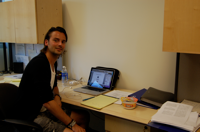
University:
Major:
Mentor(s):
Faculty Sponsor(s):
Faculty Sponsor's Department:
Project Title:
Project Description:
In the degree of scientific knowledge creation per country, rankings show that the Netherlands is in fourth place[1]. However for business, such as start-up companies, a recent report on entrepreneurial activity shows that the Netherlands is ranked in 30th place[2]. Combined, this indicates that the knowledge-business conversion can be optimized in the Netherlands. In this study, the United States (top rankings in both categories) was used as a benchmark to examine ways to improve the knowledge-business conversion in the Netherlands. Four research methods were employed: (1) review of general literature on the topic of university entrepreneurship, (2) in-depth interviews with scientists, business managers and employees of technology transfer offices, (3) monitoring the start-up of a technological spin-off in the Netherlands and (4) the experience of being part of a scientific research intern program at the University of California, Santa Barbara. The results showed that besides psychological effects and funding, policies are also very important. For instance the Bayh-Dole act (adopted in the United States in 1980) facilitated the patent process in the United States, which made it possible to issue patents for commercial purposes and has led to more structured technology transfer offices compared to the Netherlands. The findings of this study can be used as a basis for further research, from which recommendations can be given for improving the knowledge-business conversion in the Netherlands.
1 Thomson Reuters, 2009. Essential Science Indicator. [Online] available at: http://www.sciencewatch.com (data/rankings – country profiles) [accessed 25 June 2010] 2 Doing Business, 2010. Rankings. [Online] available at: http://www.doingbusiness.org [accessed 25 June 2010]
